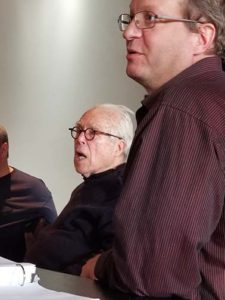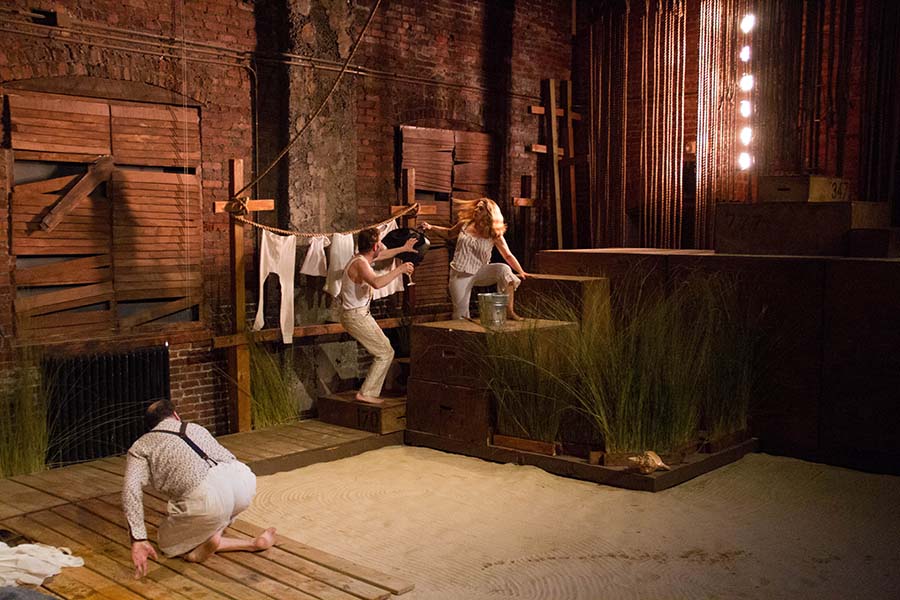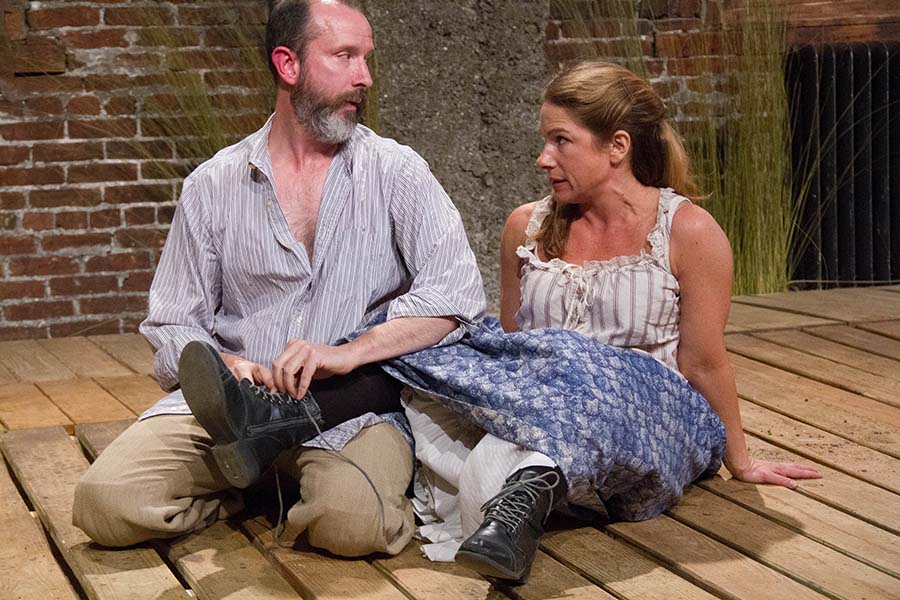Tall, white-haired John Guare, 80, arrives at opening night of the first play in his Lydie Breeze Trilogy sporting his signature owlish glasses and bowtie. He is “thrilled” to be here in Philadelphia, never having dreamed that the trilogy would finally be performed all together.
Guare, best known for The House of Blue Leaves, Six Degrees of Separation, and A Free Man of Color, first wrote two intertwined plays—Lydie Breeze and Gardenia—in 1982, then revised them in 2000, then finally completed the work by adding a third and giving them new titles (Cold Harbor, Aipotu, and Madaket Road) for EgoPo Classic Theater’s 2018 season.

The project has been a long time coming. Lane Savadove, artistic director of EgoPo has been planning it for 16 years, ever since he worked as the associate director on the New York Theatre Workshop production of what is the trilogy’s parts 1 and 3. Shortly afterwards, Savadove brought Guare to New Orleans, EgoPo’s original hometown, to work with him on Part I, which he directed, and to start planning for a production of the full trilogy.
EgoPo came to Philadelphia in 2005 to perform in the city’s annual Fringe Festival. While they were here, Hurricane Katrina wiped out their NOLA home base and they decided to stay in Philadelphia rather than return home. They have since become a much-admired staple of the theatre community.
Guare started writing the trilogy in 1973 when, in a “why not?” moment, he accepted an invitation to work in Nantucket, the plays’ setting. “Lots of writers were writing plays about New York. I wanted a world that belonged only to me,” he told me. In Nantucket he saw an island with “a sense of lost grandeur,” evoking Emerson and the whaling world of Melville. The three plays are framed by quotations from Walt Whitman, defining them as a distinctly 19th-century American saga. Whitman is, for Guare, the American voice: “He was the crucible for forming the American dialect, and the American Dream, and the American psyche; he coalesced all that was good about America; the freedom and the joy of that is remarkable. He gave America a voice. It’s a world that we don’t go into enough; we can’t allow it to fester on a shelf—it’s still alive.”
Part 1, Cold Harbor, follows Lydie Breeze, a battlefield nurse, and three men who are devoted to her as they all suffer through the horrors of the Civil War. They finally reach the island of Nantucket and establish an idealistic commune, full of hope for the future. “We are transformed by experience,” Breeze proclaims. “Not I. Not you or you or you. But us. On this beach. Right now. Together we’re a great soul capable of doing extraordinary things.”
As anyone might guess, things go wrong, with sex and money work their usual mischief. In Part 2, Aipotu (“utopia” spelled backwards), Lydie is wrecked, her lover Dan has been killed by her husband Joshua, who is now in prison, and their illiterate sidekick has gone to Harvard and become a slick lawyer. The play concludes with what may be the perfect cliffhanger—“Anything can happen. That is the most horrid fact about living.” It’s a lesson about drama as much as life.
This sets us up for Part 3, Madaket Road (formerly Home), when, after Lydie’s suicide and the symbolic as well as literal infection of syphilis has been passed among them by rape and revenge, it is left to the next generation to try to reinvent their lives; the final lines of the play are Whitman’s, “On the beach at night alone…”

I spoke to Guare about his career, his craft, and the national character.
TOBY ZINMAN: Obviously playwrights write in different voices, but how do you write in the language of a different century?
JOHN GUARE: You have to ask yourself, what don’t they know? My grandparents were born in 1860. 1860! I was curious to know what their lives would have been like. I’m a great reader of the literature of that period—I love reading William Dean Howells. I wanted to write a 19th-century novel. What we love becomes our obligation to try to put on the stage. It was a great project; it used muscles I’d never used before, and it’s wonderful to come back to it; it’s very moving to see it again.
The four central characters have such high ideals and those ideals collapse; is this paradise lost an allegory of America?
Well, we haven’t ruined everything; I’m amazed at the resilience of America. One of the things that gets us into trouble is the spirit of self-reliance, the feeling that I can do it all alone. People like Lydie are so firm in their beliefs that they can’t bend to the winds of reality. It’s not paradise lost; it’s paradise reinvented. That’s the great gift of America, the sense of reinvention. If it were a cynical work, there would be no hope and I wouldn’t have been able to write it.
Your plays, especially the most famous ones, all seem so different from one another.
The distance between Six Degrees and House of Blue Leaves is enormous, as is the trilogy. And the three Lydie Breeze plays are each written in a different style. What you have to do is keep painting yourself into corners.
What are you working on now?
I have a new play for next season, at a theatre “to be announced” that will be directed by Jerry Zaks. And I’m working on a new play, trying again to paint myself into another corner. But I won’t say anything more out of sheer superstition.


